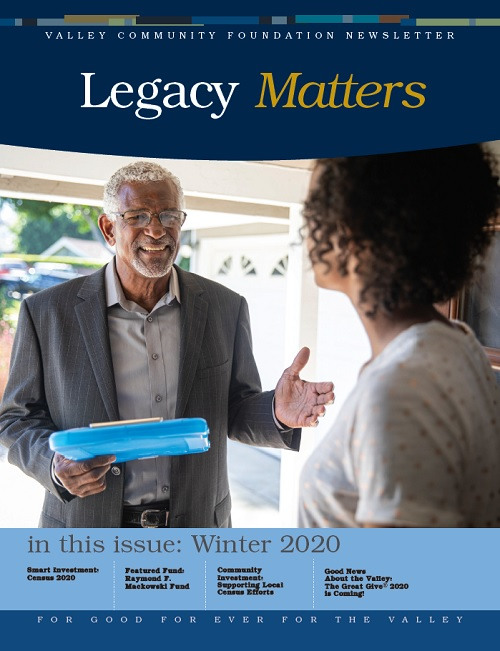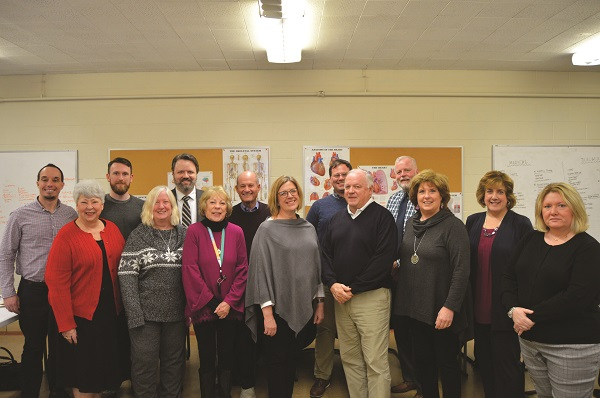Smart Investment - Census 2020
Complete count efforts are meant to encourage participation and demystify misconceptions. to make sure that everyone particpates.

In the United States Constitution, the nation's founding fathers mandated a census be conducted every 10 years. The first census was completed in 1790 and counted a total of 3,893,635 people living in the 15 states that then made up the United States of America.
The 2010 Census recorded 308.7 million inhabitants, a 9.7 percent increase from the 2000 Census population of 281.4 million, demonstrating how much a population can change between counts.
According to the U.S. Census Bureau, both George Washington and Thomas Jefferson expressed skepticism when looking at the 1790 Census results, fearing that not all people had been counted. This is a concern that is still true today and a priority for people like Allen Schwartz, who chair regional Complete Count Committees (CCC).
Schwartz said, "I was a local office manager during the 2010 census and, of all the jobs I've had, I enjoyed that one the most. I built a team that was committed to doing the best job it could and I had an opportunity to talk with community groups. It was heartwarming to meet those people and rewarding to know that what we were doing had value. Now, I can do it again in 2020 and it's just as worthwhile. I'm impressed with how knowledgeable those serving the Valley towns are and how willing they are to assist with our efforts."
 |
| View the complete Winter 2020 issue of Legacy Matters. |
The CCC is dedicated to educating the public about how census data is collected and utilized. These efforts are meant to encourage participation and demystify misconceptions. Members include representatives from schools, veterans' groups, senior centers, nonprofits, and many others. Schwartz added, "We share ideas about how to communicate the purpose of the census and how to ensure everyone participates."
The data is vital for countless reasons. Should the census results show a shift in population, some areas might gain or lose representation among elected officials in the House of Representatives, triggering a redistricting action. Funding from the government, at $675 billion or $2,900 per person, may be lost if people are not counted, impacting many essential programs.
Roberta Cook, President and CEO of BHcare, explained, "As health and human service providers, we will have to live with what happens in this census for the next decade. Given that the census is used by state and federal governments to determine grant levels, it is critically important for programs like ours, which rely on that funding to service those with mental health or addiction issues, to know that we've taken an accurate count."
Rick Dunne, Executive Director for the Naugatuck Valley Council of Governments (NVCOG), pointed to the competition between states as each vies for federal funding. "Those who do a better job of counting the people living in that area end up doing better in federal formula grants. Each town has a complete count committee because getting an accurate count is key. At the end of the day, a good count will result in a solid legislative representation, a better return on our investment of federal taxes, and a better community."
NVCOG's work as a Census Bureau contact for the region takes place every year, as opposed to the decennial census work. "Our job was to confirm local addresses. We found approximately 14,000 addresses that were either missing or part of new construction efforts since 2010 for our 19 towns. Without that verification, there would be no outreach to those folks and we would not count upwards of 50,000 people."
As a metropolitan planning organization, NVCOG relies on accurate census data to help define the community's dense infrastructure. "We help to update this data every year. For example, we work on the American Community Survey, which profiles a smaller population and asks more information during interim years," Dunne said. "We want to know where our people are and if our communities are growing or shrinking because tools like this help us plan the dedication of resources, such as transportation."
He stressed the importance of census participation for business as well as municipal planning. For example, a big box store might avoid a community should it mistakenly think there are not enough customers due to an inaccurate count. "It can be easy to miss a lot of people in a small area when you're dealing with compact places like we have in New England."
To help ensure that this doesn't happen, the CCC is generating ideas that will make it easier for everyone to participate in the census, such as leveraging the power of local libraries, where questions can be addressed.

A commonly voiced concern is security and Schwartz noted, "People are sometimes unwilling to share their information for fear of falling victim to a scam. As important as it is to get this right, it's just as important for everyone to know that no personal information is collected in this process. Census data cannot be used for law enforcement purposes and confidentiality is strictly maintained. The raw census data, such as names and addresses, remains confidential for 72 years."
Schwartz said, "This census in particular is historic because, for the first time ever, people can complete the questionnaire online as well as by mail, phone, or in person with a door-to-door census representative. April 1, 2020 is Census Day and you'll get something in the mail before then, describing the process, which is to answer a list of brief questions, including name, age, and gender."
He added, "For example, some people may wonder if their children are too young to be counted in the census. The fact of the matter is a newborn baby will be impacted by this census data for the first decade of his or her life before the next count occurs in 10 years. If you, your children, or anyone in your household is a resident in this state on April 1, then you should participate in the census here."
Schwartz concluded, "The census impacts so many aspects of our life that simply could not be effective without accurate data. A successful 2020 Census will be an accurate census. Everyone should be counted because every single person matters. It's quite an undertaking but it's really good work that needs to be done."
